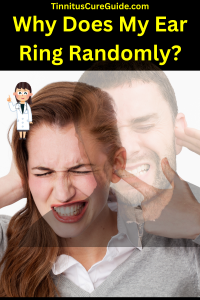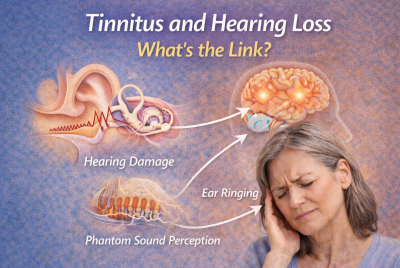Why Does My Ear Ring Randomly? Understanding the Causes and Solutions
That Unexpected Ringing in Your Ears
You’re sitting quietly, and suddenly — a high-pitched ringing or buzzing takes over your ear. It may last just a few seconds or linger long enough to distract you from what you’re doing. If you’ve ever asked yourself, “Why does my ear ring randomly?” you’re not alone.
Millions of Americans experience this strange phenomenon. Sometimes it’s nothing to worry about, but other times it may be linked to hearing issues or medical conditions that deserve attention. This article breaks down the causes, symptoms, treatments, and prevention tips for random ear ringing, so you can better understand what’s happening and what to do about it.
What Does Random Ear Ringing Mean?
When you experience ringing in your ears without an external source, it’s known as tinnitus. While tinnitus can be constant, many people notice it randomly throughout the day or at night when it’s quiet.
Common descriptions of random tinnitus include:
-
Ear buzzing sound
-
Whooshing in ears
-
High-pitched ear noise
-
Pulsating or rhythmic sounds (pulsatile tinnitus)
-
Clicking, humming, or roaring
According to the National Institute on Deafness and Other Communication Disorders (NIDCD), around 10% of U.S. adults experience tinnitus, and about 25% find it disruptive to daily life.
Why Does My Ear Ring Randomly? 7 Common Reasons
1. Exposure to Loud Noise
Random ringing often happens after concerts, sporting events, or using headphones at high volume. Even short exposure can cause temporary tinnitus.
2. Earwax Blockage
A buildup of earwax can put pressure on your eardrum, leading to ear ringing or muffled hearing.
3. Stress and Anxiety
The stress and tinnitus connection is well-documented. Stress increases awareness of internal sounds, which can trigger or worsen random ringing.
4. Sudden Tinnitus from Hearing Changes
A sudden change in hearing — like from age-related decline, fluid in the ear, or ear infections — can cause intermittent ear ringing.
5. Medication Side Effects
Some drugs, including high doses of aspirin, certain antibiotics, and chemotherapy drugs, can lead to random ear buzzing.
6. Circulatory Problems
If the ringing follows your heartbeat (pulsatile tinnitus), it may signal vascular issues such as high blood pressure or narrowed blood vessels.
7. Jaw and Neck Issues
TMJ disorders or neck tension can sometimes cause ear ringing, leading to surprising causes and cures, as the problem isn’t located in the ear itself.
When to Worry About Random Ear Ringing
Not all random ringing is harmless. You should see a doctor if you notice:
-
Sudden tinnitus in one ear only
-
Ear ringing with hearing loss or dizziness
-
Pulsatile tinnitus (heartbeat-like whooshing)
-
Ear ringing that interferes with sleep or daily function
-
Chronic tinnitus lasting longer than a few weeks
Treatments and Remedies for Random Ear Ringing
Medical Treatments
-
Hearing aids for tinnitus – Improve both hearing and reduce perception of ringing.
-
Sound masking devices – Create background noise to make tinnitus less noticeable.
-
Medication adjustments – If drugs are the cause, a doctor may change your prescription.
Natural Tinnitus Treatments
-
White noise for tinnitus – Fans, sound machines, or apps can help, especially for ear ringing at night.
-
Relaxation techniques – Yoga, meditation, and deep breathing reduce stress-driven tinnitus.
-
Best supplements for tinnitus – Magnesium, zinc, or ginkgo biloba are popular in the U.S., though evidence is mixed.
Lifestyle Adjustments
-
Limit caffeine, alcohol, and nicotine
-
Practice good sleep hygiene
-
Use protective earplugs in noisy environments
-
Exercise regularly to boost circulation and lower stress
Coping Strategies: Living With Random Tinnitus
If random ear ringing becomes frequent, coping tools can help you stay in control:
-
Tinnitus sound therapy apps – Many U.S. options like ReSound Relief and Starkey Relax.
-
CBT (Cognitive Behavioral Therapy) – Helps reduce stress and improve emotional response.
-
Support groups – The American Tinnitus Association (ATA) connects people for advice and encouragement.
Tinnitus Prevention Tips
Preventing random ear ringing isn’t always possible, but you can lower the risk:
-
Keep music volume under 60% for no longer than 60 minutes (the 60/60 rule).
-
Wear noise-canceling headphones or earplugs in loud places.
-
Manage stress with regular exercise, meditation, or journaling.
-
Get annual hearing tests, especially if you’re over 50.
-
Maintain a heart-healthy lifestyle to reduce circulatory-related tinnitus.
FAQs: Why Does My Ear Ring Randomly?
1. Why does my ear ring randomly for a few seconds?
A brief episode of ringing in the ear, often lasting a few seconds, is usually harmless. It can result from stress, fatigue, sudden hearing changes, or temporary nerve activity in the ear. If these episodes are infrequent, there’s little cause for concern, but a doctor should check frequent or worsening ringing.
2. Can random ear ringing mean hearing loss?
Yes, random ear ringing can be an early sign of hearing loss. Damaged hair cells in the inner ear may send false signals to the brain, creating ringing or buzzing sounds. If you notice frequent tinnitus along with difficulty hearing conversations or background sounds, it’s essential to schedule a hearing test with an audiologist.
3. Is it normal for ears to ring occasionally?
Yes, it’s normal for ears to ring occasionally. Many people experience temporary tinnitus after exposure to loud sounds, fatigue, or stress. In most cases, the ringing fades quickly and doesn’t require treatment. However, if ear ringing becomes chronic, one-sided, or interferes with daily life, it’s best to seek medical advice for proper evaluation.
4. Why does my ear ring randomly at night?
Random ear ringing at night happens because the surrounding environment is quieter, making tinnitus more noticeable. The brain focuses on internal sounds when there’s less background noise. Using white noise machines, sound therapy apps, or soft background music can help mask the ringing and improve sleep quality. A doctor should evaluate persistent nighttime ringing.
5. Can stress cause my ears to ring randomly?
Yes, stress can cause your ears to ring randomly. Stress and anxiety increase your body’s “fight-or-flight” response, which heightens sensitivity to internal sounds and can trigger or worsen tinnitus. Many people notice buzzing in their ears or high-pitched sounds during stressful periods. Relaxation techniques like meditation, deep breathing, and exercise can often reduce stress-related ear ringing.
6. What should I do if my ear rings constantly?
If your ear rings constantly, schedule an appointment with a doctor or audiologist. Constant tinnitus may signal hearing loss, earwax buildup, circulatory problems, or other conditions. Treatments may include hearing aids, sound therapy, or managing underlying health issues. Avoid loud noise, reduce stress, and use white noise devices to improve daily comfort while awaiting medical guidance.
Conclusion: Taking Control of Random Ear Ringing
So, why does my ear ring randomly? For most people, it’s a temporary and harmless experience linked to stress, noise exposure, or minor ear issues. But when ringing becomes sudden, persistent, or disruptive, it’s a sign to see a doctor or audiologist.
With today’s treatments — from sound therapy apps to hearing aids for tinnitus — and lifestyle adjustments, you can take control of random ear ringing and prevent it from interfering with your life.
Disclaimer
This article is for informational purposes only and does not replace professional medical advice, diagnosis, or treatment. Always consult with a qualified healthcare provider if you experience frequent, sudden, or disruptive tinnitus.







